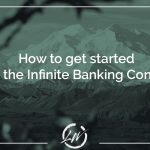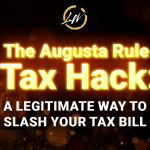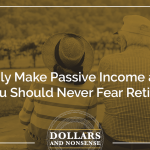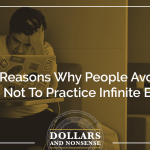In this episode, we discuss how infinite banking is not a get out of debt system and why that thinking easily confuses both the novice and the experienced infinite banker.
Topics Discussed:
- Is debt elimination the real point of the Infinite Banking Concept?
- How it is fundamentally a banking system
- Being a customer of a bank vs. being your own bank advantages
- The counter-intuitive what of making a profit off of expenses
Episode Resources:
- Gain access to our Secret Banking Masterclass now FREE to listeners of the podcast here now
- What is Infinite Banking
- Who was Nelson Nash?
- CREDIT: Episode art background photo by Pascal Debrunner
Podcast transcript for episode 136: Why People Confuse Infinite Banking Concept
Nate: In this episode, we discuss how infinite banking is not a get out of debt system, and why that type of thinking easily confuses both the novice and the experienced infinite banker. She’s Holly, and she helps people find financial freedom.
Holly: He’s Nate. He makes sense out of money. This is Dollars and Nonsense. If you follow the herd, you will be slaughtered.
Nate: All right, Holly, well, it’s great to be back. It’s great to be in front of the audience and talking about a topic that we’ve run into a decent amount when I speak with new clients that are just learning about infinite banking, as well as clients that have been around for a long time. Somehow, some way, there’s this thread that people get latched onto that the infinite banking concept is mainly a get out of debt system of some sort, like one of the main things and the whole purpose of IBC is to get out of debt. And it causes a lot of confusion for people who either start out IBC without debt, they’re like, “Well, if that’s what it’s all about, why am I even going to do it?” And then also, for the people who have been practicing IBC who wind up out of debt, they’re like, “Well, what’s next?”
So we wanted to dive in today and talk about some of the reasons why it is not all about paying off debt. And then I guess we would lean into what it’s really about. What exactly are we trying to accomplish with IBC if it’s not getting out of debt?
Holly: What it is, is a system, and it’s in the name of it, an infinite banking system, so you are literally trying to create a banking system, a closed system for your money. So in reality, it really isn’t just, “Oh, how much can I pay off debt?” And we have so many people, maybe they don’t have any debt, so if they automatically, they assume it’s only for paying off debt, or recapturing debt, or however you want to phrase it, they automatically say, “Well, it’s not for me.”
Nate: I know. I know. I hear that quite often with somebody new like, “Well, what’s the point of me doing this? I don’t have any debt already. So why would I want to do this?” And I definitely get the reason for it. I think there’s confusion there because any time a strategy is going to call itself becoming your own banker, it would make sense if I’m having to constantly borrow money from banks to do this system. But since I’m not borrowing money from banks quite often, then why would I do that? So I definitely understand the confusion just by the name of banking and our thoughts about banking, why people would lean towards that, why they think that way.
And then even if you read Nelson Nash’s book, Becoming Your Own Banker, that really started everything and coined the term. He just spent a lot of time talking about the importance of getting banks out of your lives completely. And he was very strong principled man. He was very strongly focused on the principles that he believed in. And he hates banks.
Holly: Yeah, he really does. He does.
Nate: And I don’t know a lot of people who are huge fans of banks. I mean, there’s good bankers out there. But as far as all the rules and restrictions that come with using bank loans and different things, becoming your own banker and the idea of getting out of debt, people do cling to that because no one really wants to be in debt in the conventional term. And so Nelson Nash talks about that quite often, but I guess you can’t let the nickel hide the dime. In other words, while many people do get out of debt when they practice infinite banking, and many people avoid banks, and that’s a huge part of this philosophy. It’s not some sort of get out of debt system that I think people think it is, which causes a lot of confusion.
Holly: I think, Nate, it also causes people to automatically disregard the system or infinite banking because their mentality is, it’s just a way to get out of debt. And until we change the mentality and understand that it’s actually a way to create a banking system for you and create wealth for you and your family, you have to have the mind shift.
Nate: You really do. It depends on really where you’re at, in other words, whether or not you’re going to pay any debt off when you start infinite banking really just depends on: Do we have debt sitting around that we need to pay off? So if infinite banking is not about getting out of debt, then what is it? What is it all about? And infinite banking at its core is all about becoming more profitable in the banking world by becoming an owner. And if you have deposits at the bank, you are a customer of the bank. You have loans with the bank, you’re a customer of the bank. We don’t make any more, or very much at all, being customers of the bank. The bank makes a ton of money because they own the system that’s creating all this profit.
Nelson Nash was the genius that realized that there is this tool out there called dividend paying whole life insurance issued by mutual companies that you can use just like you’re already using bank accounts, but at the end of the day, instead of some shareholder on Wall Street or something like that receiving dividends and growth on his portfolio because he’s an owner of the bank, instead of somebody else doing it, in a mutual life insurance company, the policy holders are the owners. So all of the profits that the company makes are distributed back to policy holders as opposed to shareholders like you would find in a conventional bank arrangement. And so it’s the only tool that we know of in the marketplace that allows us to plug into essentially the banking world, but not as a customer of somebody else’s bank, but as an owner of the bank itself. What exactly is IBC all about? In a nutshell, it’s just simply all about becoming more profitable in the banking world by becoming an owner of the bank as opposed to a customer of the bank.
Holly: Nelson says in his book you should be in two jobs, the one you love and that of a banking, banker. When you think of the Infinite Banking Concept, you have to say, “This is a job,” per se. You are becoming an owner of a bank. That’s how you have to look at it. You’re doing it to make a profit. And most of us have never, ever thought that there’s profit involved in changing the direction of the money or by not necessarily only being a customer of the bank, but actually owning your own bank. And we think it’s very complicated and hard to do, but when you really use the mutual life insurance company, the dividend paying whole life, then you really actually are an owner, and you really do actually have ownership that actually provides profit. And you can be profitable a lot sooner just by taking the step to start your own bank.
Nate: Yeah. So part of infinite banking certainly would be paying off debt. In other words, if you’re someone who comes in, you’ve got car loans, student debt, credit cards, and you’ve got all these things floating around, there’s just no better feeling than getting all of those guys gone. And so we will build up policy cash value, use it to pay off everyone else, and then you can pay you back and recapture all the money. That is a big part of it. That’s just not what it’s actually about at its core because if that was all it was about, then everyone who doesn’t have any debt wouldn’t have a place for it. But at the end of the day, infinite banking is not a get out of debt system by itself. It’s all about profiting in a way that’s new for most people, profiting on the movement of money.
So if we take a step back, we realize everyone is in the same type of financial arrangements, where we’re earning an income, and that typically will flow into the banking world in some way, through direct deposit or some sort of bank account. And then we use that bank account to pay all of our bills. And whatever’s left, we try to make some sort of investment with it because if we leave it in the banking world, we know that we’re not going to make any money, so we have to take it out of the banking world. Whatever’s left, and let’s say we’re saving 10% of our income, we’ve got to go find someplace to put that 10% of our income to put it to work and earn a return on it. But the problem is we don’t really fully grasp the fact that 90% of our income is hitting a bank and is being paid out, and is money that we’ll never be able to make a profit from again.
And so there’s a couple things involved with infinite banking. One is how about we keep more than just 10% of our income by paying off all the debts that are around us and recapture that money, so instead of me living and saving technically 10%, I’m going to increase that because I don’t have any debt. So all of the money that was walking out the door gets to come back to me. That is a huge deal. But nonetheless, even if you don’t have any debt, we’re still in the same predicament that a small sliver of our overall economic power is actually able to be put to work and earn us any money because the banking world itself, we are just customers of somebody else’s system. We don’t make any profit.
So the question is: All this 90% of our income that never earns us a dime, is there any way that we can roll that into a bank that actually makes us money and still operate in a similar way that we’re used to in the banking world? And that is what the concept’s all about, is showing how it’s possible to use dividend paying whole life insurance to do that very thing and how it can make us more profit.
Announcer: Are you still stuck in insecurity and uncertainty? Do you want to feel like a financial genius and confident about your future? Holly and Nate have prepared something exclusively for Dollars and Nonsense listeners. It’s called The Secret Banking Masterclass. You can gain free access to this course by visiting livingwealth.com/secretbanking. That’s secretbanking, all one word. The course will share with you how the conventional system stacks the deck against you and exactly how to break free from their system. We believe in challenging the status quo. We believe in defying conventional wealth tools while maintaining traditional values. After all, most of those conventional tools only ever seem to make someone else on the inner circle rich. Visit livingwealth.com/secretbanking. That’s secretbanking, all one word. Ease your worry and start your journey towards security today. Visit livingwealth.com/secretbanking. Now back to the great episode with Nate and Holly.
Nate: I hope that we can maybe pan back, zoom out a little bit, and not get caught up on, hey, this is a great way to buy cars, or hey, this is a great way to pay off debt, or hey, this is a great way to do this, and actually see the system for what it is. It’s simply a way that we can become more profitable in the banking world by becoming an owner. And as much of our money that we can roll into our bank and then pull it out and go utilize it from there, the more profitable we will be because in our bank, we’re the only people that profit from any of the money that’s earned inside of it. Somebody’s going to make that money. We just feel it should be you and me.
Holly: Yeah. It’s the ability to actually create wealth just by changing where your money is going. And instead of just sitting there and being complacent, and giving it to the bank and just letting the bank make all the money, this allows you the ability to be able to make money with your money.
Nate: Yeah. Every dollar that flows through the financial system in America is making somebody a little bit of money. We just want to try to get that little bit of money on as much money as we possibly can over our lifetime, and suddenly, we have hundreds of thousands, if not millions of dollars in money that would not have existed for us apart from being able to figure out a way to recapture it. And if there is another way to do it that does not use dividend paying whole life insurance policies, any listener out there who cares to shoot us an email, or let us know your strategy because right now, this is really the only strategy we know of that works, that allows us to profit on the movement of money, as it comes in and out of our hands, inside of the banking world itself. We really don’t know of any other way to do it, but this is one of the reasons why we believe that everybody ought to become their own banker. There’s really nobody out there that this would not benefit in some way.
There’s no reason why you shouldn’t. I mean, there’s literally only money to be made. And there’s literally no downside at the end of the day, to some degree. I don’t want to go too deep into that. I mean, I’m sure there are some, but what I’m trying to say is everybody could easily benefit from this concept because everybody banks. It is just part of society. We just want everyone to have a little bit better control and profit from what they’re doing. So everybody needs to do it, the question is: How big do you want it to get? In other words, you can start with something just small and just kind of rainy day money type of thing, versus other people may try and throw almost all of the money that goes through their hands into policies and pay all their bills from it. And you can go anywhere in between.
So the question is not: Should I become my own banker? The question is really: How big do I want my bank to get? And there could be reasons why you don’t want to go too big either. It kind of depends on where you’re at, what you want to accomplish with it, and some different things. And how much time, how much runway do we have to create it? So there’s all these things that would go into the scale side of the equation. But apart from that, everybody should start at some scale because we’re all going to bank and we want to make more profit doing it. To wrap it up, Holly, IBC is not about paying off debt. It’s not a get out of debt system. It is becoming your own banker, which is a far bigger process than simply paying off loans at banks. We may end up paying off loans at banks, especially if that is one your desires. But at its core, what it is, is becoming more profitable in the banking world by becoming an owner of the bank, as opposed to a customer of somebody else’s bank. That’s at its core what it is.
Holly: If you want to have wealth and you want to make your money do more than one thing, and you want to break that system, where you basically are doing all the work, and everybody else is profiting from the work you’re doing, and they’re getting your dollars, you have to start the infinite banking system. And it’s where you’re comfortable at. It’s a matter of just getting started. You can always scale up, but the reality is you have to get started in order to do anything. So I’m sure there are some downsides, Nate, but it’s one of the safest places or most secure places, with no risk to put your money to be able to make money.Nate: Exactly. I mean, maybe I know this isn’t the purpose of the podcast really to get into the pros and cons of IBC or anything like that necessarily, but I mean, really the only downside to it is just that it takes time to build it. So in other words, if you don’t have time to build, then you would want to start at a low scale. If you have time to build, you might want to start at a high scale. And we can talk about that maybe in another episode. But all that to say, we’re all going to practice banking someplace and some way, so if there’s another way to do it, let’s dive in. Let’s figure it out. We have a way that we know works, that’s been being done since the 1980s as far as Nelson Nash’s mentality, or Nelson Nash’s group. But I mean, it’s a product that’s been around and been used for these types of banking things ever since the 1800s. It’s a tried and true thing. We all know it works. We know hot it works.
It’s in a tax free environment. We can’t find anything else that works the same way. And so it’s the only way we really know of right now to become our own banker and make profit. That’s why we love it. That’s why we do it. But these types of confusions about how it’s all about paying off debt, or all about getting rid of loans, just kind of downplays the significance of what Nelson Nash’s system really is all about. So we try to answer those and try to get rid of those misconceptions, that way you can actually see it for what it is and practice it appropriately. All right, well, thanks for joining us today, everyone. This has been Dollars and Nonsense. If you follow the herd, you will get slaughtered.
Holly: For free transcripts and resources, please visit livingwealth.com/e136.
Announcer: Dollars and Nonsense Podcast listeners, one more thing before you go. Ease your worry and start your journey towards security today. Visit livingwealth.com/secretbanking. You’ll gain instant free access to the special one hour course Holly and Nate made for you. Again, that’s livingwealth.com/secretbanking.













